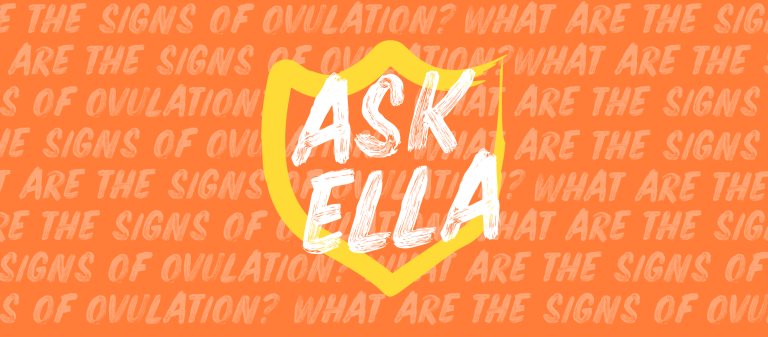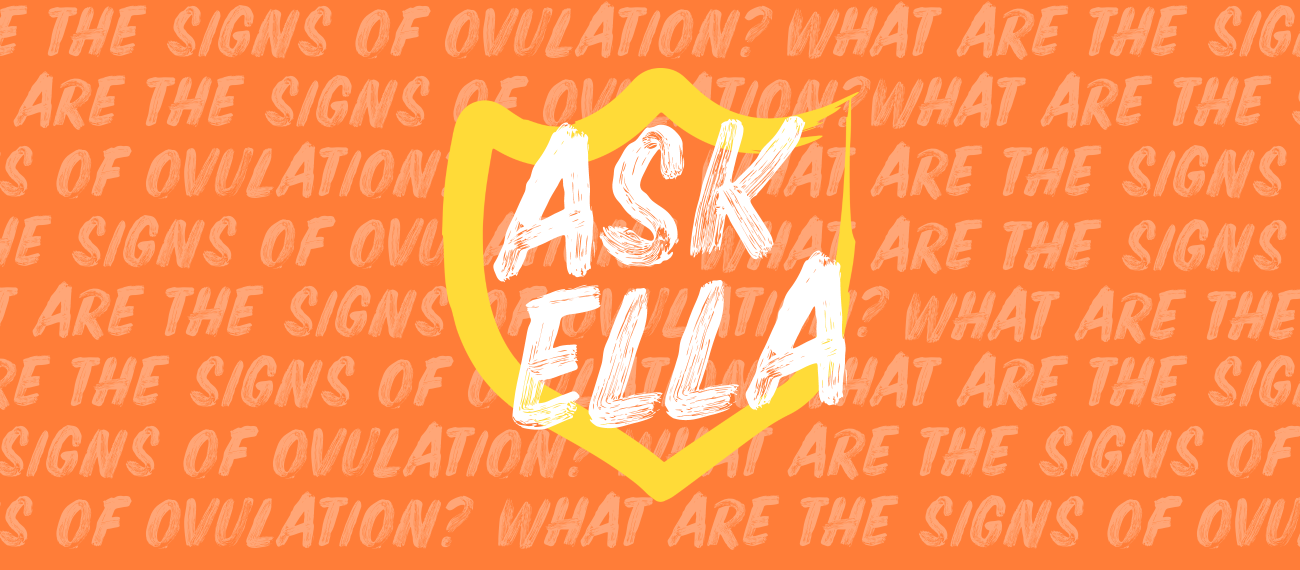What are the signs of ovulation?
We get a lot of questions about whether morning after pills like ellaOne® will work if you’ve just ovulated. The short answer is no, because when taken correctly ellaOne® delays ovulation, which is the name given to the release of a mature egg.
But how can you tell when you’re ovulating? It can be very hard to tell – especially as it’s not always consistent and can change from month to month – but there are many ways you can track your menstrual cycle to determine when you’re likely to be ovulating. Some methods involve using apps or temperature tracking to narrow it down, but it can still be tricky to pinpoint the exact moment. Some of these apps that ‘track’ your fertility can sometimes be impacted by illness, stress or your sleep cycle, which can mean that your ovulation process may not be completely accurate and that you should continue to use precautionary contraception, even if your app has told you you are not fertile, if you are trying to avoid pregnancy.
It’s useful to bear in mind that ovulation usually starts halfway through your menstrual cycle, roughly two weeks before your next expected period – although this is not the case for everyone. In light of this, it’s a good idea to get to know your body better and develop an understanding of the signs and sensations of ovulation.
But remember: you may not experience all of these signs, and you may even ovulate without experiencing any of them!
Signs of ovulation
Cervical mucus
One of the best telltale signs of where you are in your cycle is your cervical mucus. Around the time of ovulation, your discharge will become clearer and thinner and is often compared to the look and feel of raw egg whites. This is probably one of the best ways to get an idea of when you are ovulating.
After ovulation, your discharge will return to normal by becoming thicker and dryer. It can be useful to get to grips with understanding your discharge, not only because it can help you learn more about your cycle and ovulation but also so that you can recognise if it looks, smells or feels different than usual. This way you’ll begin to know if something is off, which could be an indication of an underlying issue such as an infection.
Basal body temperature
You may have heard of the term BBT, which stands for basal body temperature. This refers to your body’s resting temperature, specifically the temperature of your body when you first wake up, before your body starts being active.
Your BBT may be difficult to recognise and track yourself and is often done with a special thermometer, to help women track their fertile dates. In the time leading up to ovulation, your BBT will have a slight decline which is then followed by a temperature spike of roughly 0.5°C, which indicates that ovulation has happened. This rise in temperature is due to the release of progesterone, as your body prepares your uterus for the implantation of a fertilised egg.
If you are looking to track your ovulation, tracking your temperature daily can be useful but will take a series of months to understand. It is important to keep in mind that your body temperature is likely to fluctuate by small amounts regularly, so it can be helpful to keep track of other symptoms too.
Libido
It is also common to experience a libido boost during ovulation, which makes sense as it’s evolution’s way of spurring you on to have lots of sex and babies! While an increased libido alone is not always a sign of ovulation, when paired with other signs – such as a change in discharge – it can help give an idea of if you are ovulating.
Physical changes
You may notice some physical changes during ovulation as well. While this does not affect everyone and is also not straightforward to detect, it is not unusual for your labia – the outer part of your genitalia – to swell. Another physical symptom some individuals experience is bloating, both before and during ovulation. As bloating often occurs during other stages of your cycle such as your period bleed, bloating is not always a trustworthy sign of ovulation.
What does ovulation feel like?
You may be wondering ‘what does ovulation feel like?’ While there is no straightforward answer to this, you may feel some slight pain around your breast and your lower stomach around the time of ovulation. Similar to during your period, you may experience some breast tenderness or sore nipples, due to the fluctuation of your hormones. It is also not unusual to experience some discomfort or cramps around the time of ovulation. This pain typically occurs on either side of the lower abdomen, with pain ranging from a sharp stabbing pain to a dull cramp and lasting anywhere from minutes to hours.
This is the sensation of your ovary releasing an egg and can vary each month, from different sides of your abdomen, different lengths of time or even varying levels of pain. This feeling is often known as mittelschmerz, the German word for “middle pain”. This pain is nothing to be concerned about but if you find it to be persistent or severe, it is a good idea to get this checked out. Similarly, some women report having headaches or feeling nauseous during ovulation, due to the change in the levels of oestrogen and progesterone.
In summary
It is important to remember that these symptoms alone do not necessarily dictate ovulation and are not direct signs of fertility. You can experience ovulation without these symptoms and you can also experience these symptoms without ovulation having taken place. This is why we recommend caution around natural fertility methods of contraception, as it varies so much from person to person and cycle to cycle. Here’s a quick recap of what to look for:
– Changes in your discharge
– A boost in your libido
– A swelling of your labia
– Bloating
– Breast tenderness or sore nipples
– Mittelschmerz – discomfort or cramps in the lower stomach
– Headaches or nausea
If you have had unprotected sex or a failed contraception method – such as a broken condom or a missed contraceptive pill – there is no shame in taking emergency contraception. Sex is a normal part of life and you have every right to protect yourself against an unplanned pregnancy.
ellaOne® is the most effective emergency contraceptive pill* and is available to buy online as well as in pharmacies. If you have taken the morning after pill, why not share your experience below to help us end the stigma around emergency contraception?
ellaOne® 30mg film-coated tablet contains ulipristal acetate and is indicated for emergency contraception within 120 hours (5 days) of unprotected sexual intercourse or contraceptive failure.




